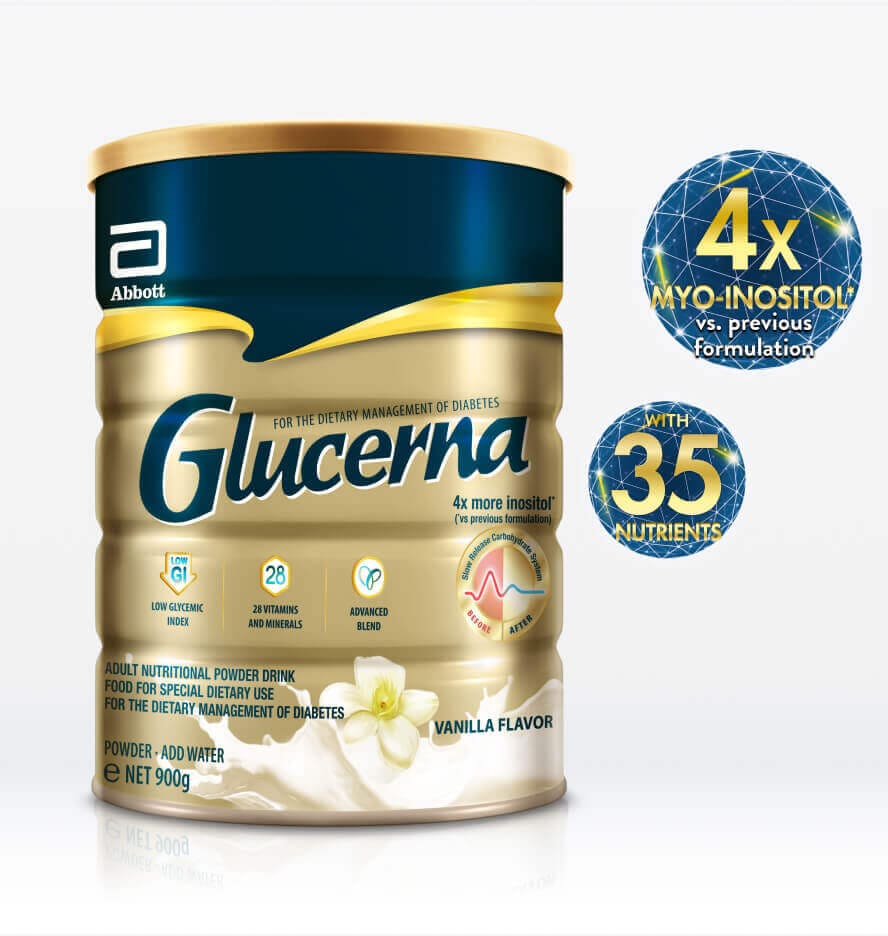Glucerna Vanilla Flavor
- Title
- Glucerna® Vanilla Flavor
- Detail Page Path
Research has taught us a few things about the role of 'confidence' in diabetes control.
A person’s confidence in their ability to change their behavior - like eating more fruits and vegetables and walking daily - is a predictor of whether they will reach their goals. Several studies show that people who believe in their ability to lose weight tend to lose more weight than those who don’t. The good news is that confidence can be learned.
People have different levels of confidence when it comes to diabetes control. For example, you may feel confident that you can eat more fruits and vegetables but not confident about turning down dessert at a restaurant. Other people may feel confident about increasing their activity level by walking more but not feel confident about their ability to add weight training to their program. "Great!" you say. "My health is important to me, and I want to control my diabetes! Where can I get some of this confidence?" The not-so-easy answer is - it comes from you.
Two essential steps will help you boost your confidence:
1. Believe that change is crucial for you in the first place.
2. Believe you can learn new and healthier eating and activity patterns. You can do it! You are at the center of this change. It’s not up to fate, your boss, family, upbringing, or gene pool. It’s up to you.
Here are some ways to discover and cultivate your confidence to change.
Go for it: Success breeds confidence.
A good way to boost your confidence to make lifestyle changes is to do exactly what you think you can’t do. Then, you’ll see that you have what it takes. For example, if you’re not feeling confident about getting out for a brisk walk, try it for just one day.
Build on your past successes and failures.
Think back on earlier attempts to control your glucose levels. What success did you have, and what contributed to that success? What did you learn from that experience? What obstacles kept you from going down the path to your goals?
Be a copycat.
Find role models and imitate their behavior. See a person turn down dessert at a restaurant? Try it yourself. There’s power in saying, "If they can do it, I can do it!"
Listen to what others say about you.
Positive comments and encouragement from friends and family can boost your confidence and resolve to change. Listen to yourself, too, if your self-talk is positive and constructive.
Change is all about doing. It helps to read about confidence and ways to improve one’s confidence level to try new things. It’s better to use what you read. Do something with it. What can you do to boost your confidence in making healthier food choices and getting more physical activity?
Emotions can be powerful, and for many of us, they can make us eat. Food can be comforting, but it can also prevent you from tackling your diabetes.
You may be thinking, if emotional eating is so deeply ingrained, can anything be done to change it? Follow the AAA strategy: Be Aware, Avoid Triggers, and Look for Alternatives.
Here’s how this tool can help:
Be Aware. Be aware and alert in situations that trigger your emotions, and do not let the moment’s feelings make you forget your goals. Pause and ask yourself whether the short-term comfort of uncontrolled eating or missing your planned exercise is worth the long-term impact on your diabetes control program.
Avoid Triggers. You can’t avoid all situations that trigger you to compromise your goals. But you can prevent some people who push your emotional buttons and stress you out. And if you’re stressed out from having too many balls in the air, let one or two drops and take some time for yourself.
Look for Alternatives. When you can’t avoid the situations that trigger emotional responses, you can look for better ways to respond. Write in your journal and describe the situation that pushed your buttons. Make a change in your physical activity; try meditation: even a warm bath is better than beer and chips. If your emotional state calls for food, however, be ready. Make sure you have healthy snacks in your fridge and cupboard, or just eat a tiny portion of the food you’re craving.
Diabetes-friendly food options needn't be boring! When you have diabetes, a healthy diabetes meal plan is key to managing your blood sugar. The right nutrition for you is easy to achieve; the key is planning.
Delicious and nutricious recipes with the benefits of Glucerna®
Exercise is critical in helping manage diabetes. It helps make the body more sensitive to the action of insulin. Make it a part of your healthy journey.
Glucerna® is the number 1 selling diabetes nutritional supplement in the world*. It contains 35 nutrients, slow-release carbohydrates and 4x more inositol vs previous formulation, that delivers a dual action for tight blood sugar control.
* Euromonitor International Limited; total global retail sales in 2023 for diabetic diet enhancer drinks that are not marketed as a meal replacement product. Euromonitor and Abbott calculation based in part on custom research conducted between October and November 2023 and Euromonitor Passport Consumer Health 2023 based on 2022 data.

You are about to exit for another Abbott country or region specific website.
Please be aware that the website you have requested is intended for the residents of a particular country or region, as noted on that site. As a result, the site may contain information on pharmaceuticals, medical devices and other products or uses of those products that are not approved in other countries or regions.
The website you have requested also may not be optimized for your specific screen size.
Do you wish to continue and exit this website?
Stay Connected